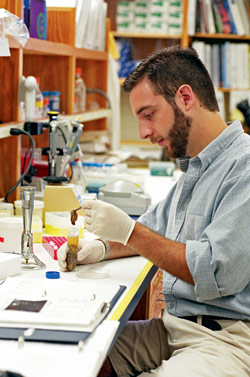 |
 Enlarge
image
Enlarge
image |
| Rob Jennings, a graduate student in biological oceanography, studies the population genetics and dispersal of marine
annelid worms around Cape Cod, Massachusetts. He is interested in the influence of recruitment and settlement on genetic estimates of dispersal. (Photo by Tom Kleindinst, WHOI Graphic Services) |
| |
| Related Links |
» Cooperative Institute for Climate and Ocean Research (CICOR)
|
| |
The Cooperative Institute for Climate and Ocean Research (CICOR) coordinates and fosters interaction
between WHOI and the National Oceanic and Atmospheric Administration (NOAA). CICOR administers NOAA-funded research, builds ties between researchers at WHOI and NOAA, and conducts
education and outreach activities. The Institute is one of 13 national cooperative institutes.
CICOR’s research themes focus on climate, marine ecosystems, and coastal research. The center supported 50 projects in 2004, including 16 new projects totaling more than $6 million in funding. Since its inception in 2001, CICOR has supported 61 research projects, bringing the four-year budget to more than $19 million.
One role of the NOAA Cooperative Institutes is to engage the academic and private research communities in working with NOAA to develop plans for research. In 2004, CICOR proposed workshops that would bring NOAA scientists and program managers together with external investigators. The proposal was endorsed, and CICOR has since held the first of a series of workshops on marine ecosystems.
Together with the Northeast Science Center of NOAA’s National Marine Fisheries Service, CICOR organized the Workshop on Planning Coordinated Research on Ecosystems, Climate, and Policy in the Northeast in January 2005. The workshop brought together
individuals from more than 30 institutions, representing
NOAA staff, fisheries and marine resource managers,
and researchers. Participants identified management needs for new research on harmful algal blooms, nutrients and contaminants, biodiversity, and fisheries.
Among CICOR’s diverse research programs, the Ocean Reference Sites (ORS)—long-term surface moorings
dedicated to measurement of the exchange of heat, moisture, and momentum between the ocean and atmosphere—
progressed under the direction of Robert Weller and Albert Plueddemann of the Physical Oceanography Department. The ORS provide essential data for improving
our understanding of atmosphere-ocean coupling and for properly calibrating the estimates and assumptions
used in climate modeling. ORS sites in the equatorial
Atlantic and Pacific are in their fourth and fifth years, respectively, of continuous operation. A third site, 96 kilometers
(60 miles) north of Oahu, Hawaii, was established in August 2004.
CICOR welcomed a new postdoctoral scholar in 2004: Nancy Grumet, a June 2004 graduate of Stanford University. She is working with Konrad Hughen in the Marine Chemistry and Geochemistry Department to understand
and reconstruct environmental conditions in the subtropical and tropical oceans through the development of coral chemical records. CICOR also continues to support
postdoctoral scholar Nicholas Scott, who is working with John Trowbridge of the Applied Ocean Physics and Engineering Department on statistical analyses of steep waves in open ocean waters. Rob Jennings (right), the CICOR-supported graduate student in the MIT/WHOI Joint Program, is working with Lauren Mullineaux of the Biology Department.
—Robert Weller (rweller@whoi.edu)
Director
|

